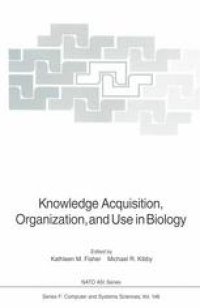
Ebook: Knowledge Acquisition, Organization, and Use in Biology: Proceedings of the NATO Advanced Research Workshop on Biology Knowledge: Its Acquisition, Organization, and Use, held in Glaslow, Scotland, June 14–18, 1992
- Tags: Educational Psychology, Life Sciences general, Theory of Computation, Artificial Intelligence (incl. Robotics), Computer Appl. in Life Sciences, Health Informatics
- Series: NATO ASI Series 148
- Year: 1996
- Publisher: Springer-Verlag Berlin Heidelberg
- Edition: 1
- Language: English
- pdf
Biology education, like science education in general, is in the midst of a revolution that is worldwide in scope. The changes in the ways science education researchers think about learning and understanding represent a major paradigm shift. In this book, international leaders in the field of biology education research give summaries of problems and solutions in biology learning and teaching at various grade levels. Based on a NATO workshop in the Special Programme on Advanced Educational Technology, it provides practical information for teachers, especially in using new interactive, constructivist teaching methods. For science education researchers, it offers a concise summary of a number of research issues in biology education.
Biology education, like science education in general, is in the midst of a revolution that is worldwide in scope. The changes in the ways science education researchers think about learning and understanding represent a major paradigm shift. In this book, international leaders in the field of biology education research give summaries of problems and solutions in biology learning and teaching at various grade levels. Based on a NATO workshop in the Special Programme on Advanced Educational Technology, it provides practical information for teachers, especially in using new interactive, constructivist teaching methods. For science education researchers, it offers a concise summary of a number of research issues in biology education.
Biology education, like science education in general, is in the midst of a revolution that is worldwide in scope. The changes in the ways science education researchers think about learning and understanding represent a major paradigm shift. In this book, international leaders in the field of biology education research give summaries of problems and solutions in biology learning and teaching at various grade levels. Based on a NATO workshop in the Special Programme on Advanced Educational Technology, it provides practical information for teachers, especially in using new interactive, constructivist teaching methods. For science education researchers, it offers a concise summary of a number of research issues in biology education.
Content:
Front Matter....Pages I-X
The Nature of Knowledge in Biology and Its Implications for Teaching and Learning....Pages 1-24
The Graphic Representation of Biological Knowledge: Integrating Words and Images....Pages 25-35
Components of Comprehension Monitoring in the Acquisition of Knowledge from Science Texts....Pages 36-43
Constructive Learning from Texts in Biology....Pages 44-64
Darwinian and Lamarckian Models Used by Students and Their Representation....Pages 65-77
Food Relations of Living Organisms as a Basis for the Development of a Teaching Strategy Directed to Conceptual Change....Pages 78-98
Cognitive Strategies in Biological Thinking....Pages 99-107
Organizing the Concept of Organism at the Elementary School Level: A Case Study....Pages 108-125
Working with Personal Knowledge in Biology Classrooms on the Theme of Regulation and Homeostasis in Living Systems....Pages 126-134
Generating Connections and Learning in Biology....Pages 135-154
A Folding Model of Concept Genesis and Its Application to Teaching Biology....Pages 155-169
Biological Interrelationships and Water....Pages 170-181
The Information in Relations in Biology, or The Unexamined Relation Is Not Worth Having....Pages 182-205
Eliciting and Representing Biology Knowledge with Conceptual Graph Structures....Pages 206-225
Biological Models: Some Significant Features....Pages 226-234
Retrospective Causal Reasoning (RCR) in Biology....Pages 235-239
Back Matter....Pages 240-253
Biology education, like science education in general, is in the midst of a revolution that is worldwide in scope. The changes in the ways science education researchers think about learning and understanding represent a major paradigm shift. In this book, international leaders in the field of biology education research give summaries of problems and solutions in biology learning and teaching at various grade levels. Based on a NATO workshop in the Special Programme on Advanced Educational Technology, it provides practical information for teachers, especially in using new interactive, constructivist teaching methods. For science education researchers, it offers a concise summary of a number of research issues in biology education.
Content:
Front Matter....Pages I-X
The Nature of Knowledge in Biology and Its Implications for Teaching and Learning....Pages 1-24
The Graphic Representation of Biological Knowledge: Integrating Words and Images....Pages 25-35
Components of Comprehension Monitoring in the Acquisition of Knowledge from Science Texts....Pages 36-43
Constructive Learning from Texts in Biology....Pages 44-64
Darwinian and Lamarckian Models Used by Students and Their Representation....Pages 65-77
Food Relations of Living Organisms as a Basis for the Development of a Teaching Strategy Directed to Conceptual Change....Pages 78-98
Cognitive Strategies in Biological Thinking....Pages 99-107
Organizing the Concept of Organism at the Elementary School Level: A Case Study....Pages 108-125
Working with Personal Knowledge in Biology Classrooms on the Theme of Regulation and Homeostasis in Living Systems....Pages 126-134
Generating Connections and Learning in Biology....Pages 135-154
A Folding Model of Concept Genesis and Its Application to Teaching Biology....Pages 155-169
Biological Interrelationships and Water....Pages 170-181
The Information in Relations in Biology, or The Unexamined Relation Is Not Worth Having....Pages 182-205
Eliciting and Representing Biology Knowledge with Conceptual Graph Structures....Pages 206-225
Biological Models: Some Significant Features....Pages 226-234
Retrospective Causal Reasoning (RCR) in Biology....Pages 235-239
Back Matter....Pages 240-253
....
Download the book Knowledge Acquisition, Organization, and Use in Biology: Proceedings of the NATO Advanced Research Workshop on Biology Knowledge: Its Acquisition, Organization, and Use, held in Glaslow, Scotland, June 14–18, 1992 for free or read online
Continue reading on any device:

Last viewed books
Related books
{related-news}
Comments (0)